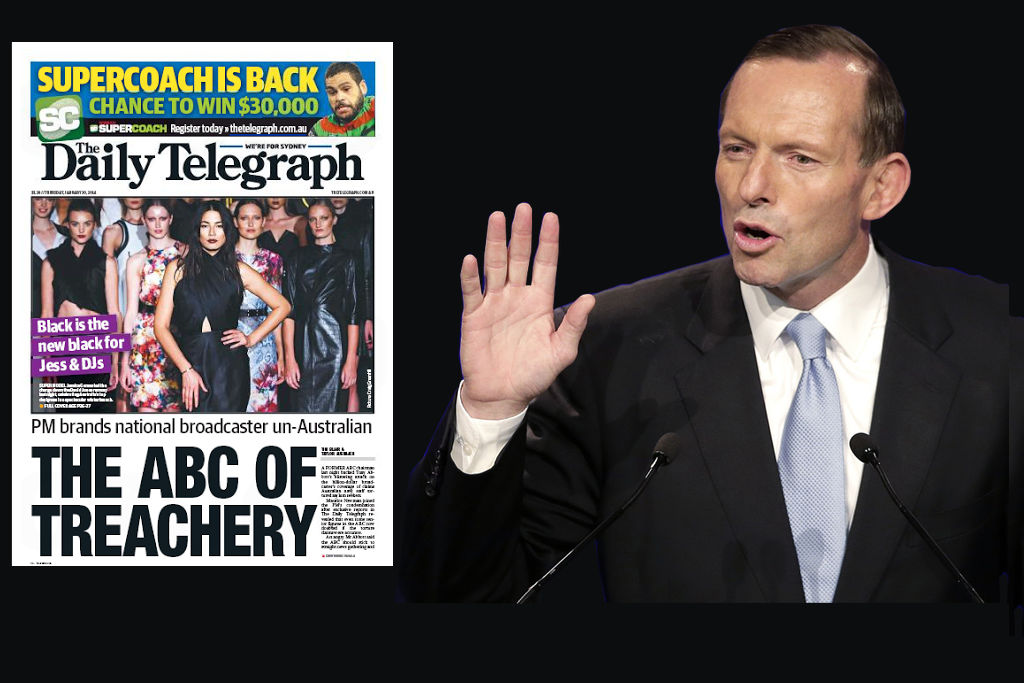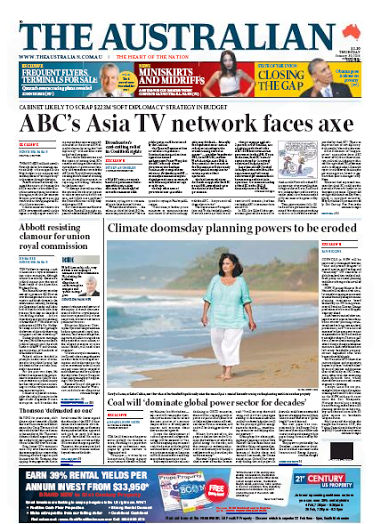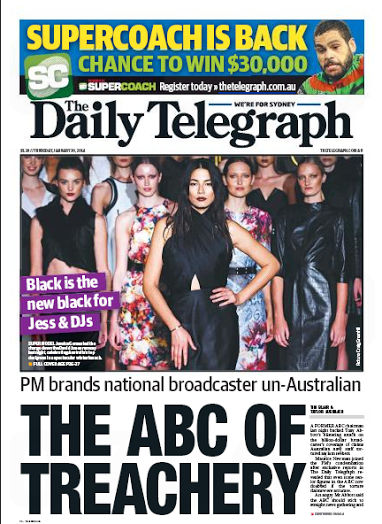Junk Explained: The Government And News Corp vs The ABC
Will you just look at those front pages this morning.

Surprising exactly zero people, News Corp’s national titles, The Daily Telegraph and The Australian, have joined the attack on the ABC this morning, capitalising on comments made by Prime Minister Tony Abbott yesterday that the national broadcaster “instinctively takes everyone’s side but Australia’s”.
Here we have the Australian, who are reporting (with not a small amount of glee) that the Government is already planning to axe News Corp’s competitor, ABC Asia TV.

–
And here we have the Daily Telegraph, who are just being belligerent.

Wait, What Happened?
A quick catch-up.
Tony Abbott made headlines yesterday over his comments to Sydney shock jock Ray Hadley on 2GB, attacking what he perceived to be the ABC’s lack of patriotism. The conversation was sparked by off-the-record correspondence from an ABC reporter that surfaced on Tuesday, which undercut the ABC’s claim that navy staff had burnt asylum seekers. “My boss feels the allegations are likely to be untrue,” she wrote to navy personnel, while seeking clarification on the story. The correspondence was then forwarded to Andrew Bolt, who of course had a field day with it.
Speaking to Ray Hadley yesterday morning, Abbott said that “a lot of people feel at the moment that the ABC instinctively takes everyone’s side but Australia’s … I think it is a problem.” When Hadley complained that he and fellow-host Alan Jones were “belted over the head” regularly by the media regulator, while the ABC was left to his own devices, Abbott sympathised — neglecting to point out that both outlets are governed by the same media standards body, who respond to public complaints rather than making their own. “I can understand your frustration,” he said. “At times there does appear to be a double standard in large swathes of our national life.”
At times, indeed, there does:
So we’re clear – last year when you were criticising the ABC for giving the Labor govt a free ride, weren’t they just being patriots?
— Ben Jenkins (@bencjenkins) January 29, 2014
“You would like the national broadcaster to have a rigorous commitment to truth and at least some basic affection for the home team, so to speak,” Abbott continued, displaying a deep misunderstanding of the fundamental ‘holding the government accountable’ role that news media plays in a democracy. “You shouldn’t leap to be critical of your own country.
Yesterday’s comments reignite the debate triggered late last year, after The Guardian and The ABC joined forces to break news that the Australian government had tapped the phone calls of the Indonesian President. At the time, Abbott’s publicly condemned ABC head Mark Scott for excersising “very, very poor judgement”, and Cory Bernardi wildly gnashed his troll teeth called for funding cuts.
And What’s Happening Today?
‘THE ABC OF TREACHERY’, shouts The Daily Telegraph this morning. The editorial claims that “a former ABC chairman last night backed Tony Abbott’s blistering attack” on the national broadcaster — before slyly revealing that said chairman is, in fact, Abbott’s business advisor Maurice Newman, an open critic of the ABC who thinks climate change is “group-think“.
Over at The Australian, meanwhile, the Government is readying for action. Dennis Shanahan reports that the Abbott’s cabinet is seeking advice on ditching ABC Asia’s TV network altogether — largely, it seems, because it doesn’t agree with the station’s reportage. “Cabinet ministers believe the ABC’s coverage of Australia in the region is overly negative,” Shanahan writes, “and fails to promote the nation as originally intended in the Australia Network’s charter by using the “soft diplomacy” of Australian news and cultural programs.” (Shanahan makes no mention of how the loss of the Asian channel would benefit News Corp’s own TV interests in the region.)
Communications Minister Malcolm Turnbull has broken ranks, defending the ABC’s editorial independence against Abbott’s and News Corp’s attacks. He said the ABC is accountable to its board of directors, not its government.
“Politicians, whether prime ministers or communications ministers, will often be unhappy with the ABC … but you can’t tell them what to write.”